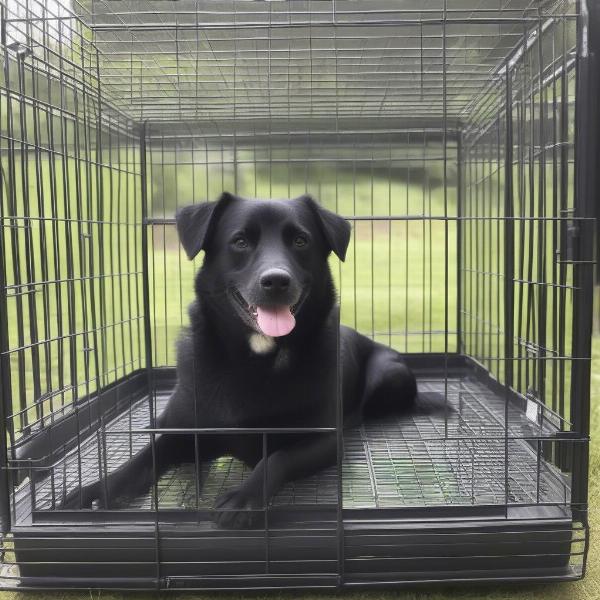Heavy duty metal dog cages are a popular choice for pet owners seeking a secure and durable confinement solution for their canine companions. Choosing the right cage requires careful consideration of your dog’s size, breed, temperament, and your specific needs. This guide will delve into the essential aspects of heavy duty metal dog cages, helping you make an informed decision and ensuring your dog’s comfort and safety.
Choosing the Right Heavy Duty Metal Dog Cage
Selecting the appropriate heavy duty metal dog cage involves several key factors. Firstly, consider your dog’s size. The cage should be spacious enough for your dog to stand comfortably, turn around, and lie down without feeling cramped. Measure your dog’s height and length to determine the minimum cage dimensions. Breed-specific considerations are also important. Some breeds are more prone to anxiety or destructive behaviors, requiring a particularly robust and secure cage. Think about your dog’s temperament – a nervous dog might benefit from a cage with a cover to create a den-like atmosphere, while a more social dog might prefer an open-wire cage for better visibility. Finally, consider your own needs. Do you need a portable cage for travel or a stationary one for home use?  Choosing a Durable Metal Dog Cage
Choosing a Durable Metal Dog Cage
Size and Construction: Key Considerations for Heavy Duty Dog Cages
The size and construction of a heavy duty metal dog cage directly impact its durability and your dog’s well-being. Opt for cages made from thick-gauge steel or reinforced wire for maximum strength and resistance to bending or damage. Welding quality is crucial; look for smooth, continuous welds to prevent weak points. The cage door should have a secure latching mechanism that your dog cannot easily open. For larger or more determined dogs, consider double-latching systems. The floor of the cage should be solid and easy to clean. Removable trays are a convenient feature for hygiene.
Where to Place Your Heavy Duty Metal Dog Cage
Strategic placement of your heavy duty metal dog cage can significantly impact your dog’s adjustment and comfort. Avoid placing the cage in areas with extreme temperatures, such as direct sunlight or near drafts. A quiet corner of your home, away from high-traffic areas, can provide a sense of security. However, complete isolation should be avoided. Placing the cage in a room where the family spends time allows your dog to feel included. Ensure the cage is on a level surface and away from potential hazards such as electrical cords or toxic substances. A 36 inch dog crate could be a good option depending on your dog’s size.
Maintaining Your Heavy Duty Metal Dog Cage
Regular maintenance is essential for the longevity of your heavy duty metal dog cage and your dog’s health. Clean the cage regularly with a pet-safe disinfectant, removing any debris or waste. Check for any signs of rust or damage, and address them promptly. If your dog is a chewer, inspect the cage regularly for any loose wires or broken welds. A dog cage for big dogs might require more frequent cleaning and maintenance. Consider a collapsible dog cage for easier storage and transport when not in use.
Conclusion
Choosing a heavy duty metal dog cage is an important decision. By considering factors like size, construction, placement, and maintenance, you can provide a safe and comfortable environment for your furry friend. Remember, a well-chosen cage can be a valuable tool for training, managing behavior, and providing a secure space for your dog to relax and feel at home.
FAQ
- How do I choose the right size heavy duty metal dog cage? Measure your dog’s height and length to ensure they can stand, turn around, and lie down comfortably.
- What are the benefits of a heavy duty metal dog cage? Durability, security, and ease of cleaning are key advantages.
- Where should I place my dog’s cage? Choose a quiet, safe location away from extreme temperatures and hazards, but still within the family’s living space.
- How do I clean a heavy duty metal dog cage? Use a pet-safe disinfectant regularly, and remove any debris or waste.
- What should I do if my dog damages the cage? Inspect the cage regularly and address any damage promptly to ensure safety.
- Are heavy duty metal dog cages good for travel? Some heavy-duty metal cages are designed for portability; check for features like collapsible frames and carrying handles.
- Can a heavy-duty metal cage help with training? Yes, it can be a valuable tool for crate training and managing unwanted behaviors.
About ILM Dog
ILM Dog is your trusted international resource for expert dog care advice. We offer a wide range of information on dog breeds, health, training, nutrition, grooming, and much more. Whether you’re a new dog owner or a seasoned expert, we provide practical tips and insights to help you provide the best possible care for your canine companion. Need help finding the perfect heavy duty metal dog cage or advice on back seat dog barriers for cars? Contact us for personalized guidance. Email: [email protected], Phone: +44 20-3965-8624. We’re here to support you every step of the way.